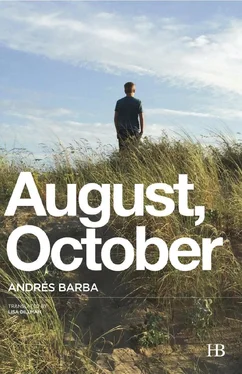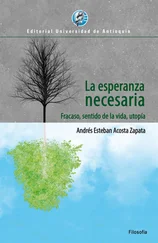Summer, though, was the time for anarchy. They all got a little impatient, a little selfish, were lively and happy most of the time, but also more prone to disappointment and tantrums. They fought more, but also confided in each other more and enjoyed spending time together. Summer was also the season of every moment of genuinely transfixed joy he could recall, of dinners when all four of them would suddenly fall silent as if something were bubbling up inside them, or propelling them forward in life, their voices growing deep and calm. He’d always yearned for summer with real excitement, and it seemed strange to him that it had been different that year. The month before their trip, for the first time in years, his father brought up the possibility of going someplace new for their summer vacation. The issue was discussed at dinner over the course of a couple of weeks, but then Aunt Eli got sick and that was the end of that — they’d go the same place as always. He felt affronted more than anything by the fact that no one had asked his opinion, but the affront quickly morphed into a strange and still-new feeling, a sort of disillusionment with his parents, a resentful disappointment; they struck him as simpletons, as doormats. Then came a very bitter dinner, two weeks before they were to leave, during which they fought intensely. Their argument lasted several minutes, growing progressively louder, and culminating in his calling Aunt Eli “a sick cow.” He knew that what had provoked his insult wasn’t animosity toward his aunt — whom he really did love sincerely — but a sort of impetuous urge; the desire to call Aunt Eli
a sick cow right in the middle of a family dispute was too new and compelling to go unheeded. In a fraction of a second, fleeting and almost irresistible thoughts darted through his mind, and in the end he was unable to resist the impulse to see what result a comment like that would have. More than insulting Aunt Eli, he wanted to incite the aftermath of the insult. He half-stood, hands on the table, and said, “I’m not spending my summer taking care of some sick cow.”
He remembered the words flowing from his mouth like liquid, something thick yet fluid. He might have been shocked at how easy it was. He wanted to be risky, to jeopardize everything. His father banged a sonorous fist down on the table, and he himself marched out of the dining room. The conclusion was even sorrier. His mother came into his room, acting as a mediator, and asked with concern why he’d said that, begged him to apologize to his father. He remembered that he’d been sitting on his bed and his mother had sat down beside him and stroked his neck, and that without wanting to, he’d blushed. He got up and returned to the dining room, apologized without looking his father in the eyes and without knowing whether he felt humiliated or just tense, and when he looked up he saw them both — his father still glowering at him, his mother standing beside him, looking startled. He wasn’t sure why, but he stopped seeing them, then, as he’d seen them his whole life, they were no longer symbols of authority, were no longer bathed in the benevolent glow of childhood, no longer superior beings; they, too, had been strangely degraded somehow. It was as though he’d discovered in them phony, unsophisticated attributes. They looked, there in the harsh light of normality, like a couple of milksops, full of fear or repressed passions.
The fight was soon forgotten, and that also disappointed him a bit; he’d become stubborn that year. They were in good moods on the train ride down, and when they arrived at the house they’d rented, their happiness made them relaxed and chatty for a few days, and then the troubling phase set in. They’d go to the beach in the morning, and on their way back to the house for lunch, he’d scan the pine trees lining the walkway, the dunes, the bodies of girls his age and of older women.
He went for a run on the beach almost every day. He loved running by the sea. At times he felt his body was a machine over which he had some sort of total control; it was a way to release the shame he was overcome by again and again and for no reason. When he got back to his parents’ beach umbrella, he’d toss his T-shirt down and go in the water, by the rocks where his mother and sister hunted for crabs. On their fifth day of vacation, when he came back from his run, he dove into the water as he did every day and felt a strange temptation — he’d plunged in without taking a big breath first, but once underwater he decided to swim to a rock about ten feet below the surface, where he saw something that looked like coral. He took two or three erratic strokes, but then halfway down he reached out for the side of the rock and grabbed hold of it. And once there, he decided to hold his breath for as long as he could. The rock was rough and black, and when he lodged his shoulder beneath its ledge to keep himself from floating back to the surface, he found he had almost no air left and knew he couldn’t last more than three or four seconds. And then he felt as if something were breaking — some resistance maybe, or fear — and it occurred to him that he could die there, and the idea didn’t frighten him in the slightest. He recalled the muffled, silent sound of the water during those seconds, and that he’d kept his eyes open. The seafloor, which must have been about thirty feet down and had first looked clear, turned a bit blurry. Looking up he saw the water’s luminous surface. He had almost no air left, and it looked staggeringly beautiful, as if it had turned into impenetrable glass. Then he felt like the water was getting thicker, thick as oil, and darker, too. Having surpassed what he thought was the limit of his resistance, he was flooded with a strange, mysterious sense of relief, as though his blood had reoxygenated. How much time had elapsed? He had no way of knowing, but that brief euphoria was followed by an immediate weakness and the feeling that everything was about to turn white, that the darkness of the seafloor would light up with a sinister glow. He wrenched his shoulder from beneath the rock ledge and with the last of his strength took a single stroke toward the surface. When he burst through the water, he gulped the air furiously, not knowing whether what filled his chest was pleasure or pain, and realized he was going to lose consciousness. He didn’t know how he managed to get back to the top of the rock. He fainted there. The next thing he remembered was being at the Red Cross clinic, and when he opened his eyes, he saw his father standing beside him.
“You gave us a real scare,” he said.
His father’s face was contorted, as though he’d had an unthinkable fright. He was very pale, and when he stroked his face — an act he began with confidence and then became embarrassed by for some reason — he could feel his hand trembling.
“Your mother and sister are outside. Everything’s OK. It’s a good thing this fellow here saw you.”
“Manuel,” said an impressively athletic young man who looked about thirty, standing beside his father with a satisfied expression.
“Manuel, yes, I’m sorry.”
Manuel seemed to feel the need to make some sort of statement, and since no one thanked him, he did it himself, mentally, and then answered aloud.
“It was nothing. What matters is that you’re OK.”
That episode was followed by a melancholy afternoon. What had happened? A thing with no name. His breathing was a bit labored, and he felt weak. Anita was solicitous, as if she were the older sibling for a day and he the younger one. He lay in the hammock on the balcony and watched her come and go, asking every fifteen minutes if he wanted a glass of water or anything. She was wearing a red summer dress from which her pudgy little legs stuck out like two reeds. It was almost heartbreaking. For several hours he seemed to have lost the ability to have normal emotions proceed one after the other. He felt drowsy but had sudden fits of unease, or anguish, he couldn’t pay attention to anything and yet there was a sort of constant thought or sound or music there, something almost intangible, a sort of fear assaulting him from outside, fear of the thing he’d almost done and that he still didn’t fully understand.
Читать дальше












